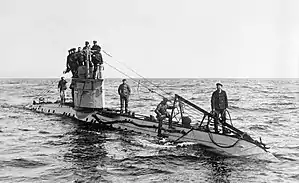SM UC-15
SM UC-15 was a German Type UC I minelayer submarine or U-boat in the German Imperial Navy (German: Kaiserliche Marine) during World War I. The U-boat was ordered on 23 November 1914, laid down on 28 January 1915, and was launched on 19 May 1915. She was commissioned into the German Imperial Navy on 28 June 1915 as SM UC-15.[Note 1] Mines laid by UC-15 during her eight patrols are credited with sinking 3 ships. UC-15 disappeared in November 1916.[1]
 German UC I-class submarine | |
| History | |
|---|---|
| Name: | UC-15 |
| Ordered: | 23 November 1914[1] |
| Builder: | AG Weser, Bremen[2] |
| Yard number: | 229[1] |
| Laid down: | 28 January 1915[1] |
| Launched: | 19 May 1915[1] |
| Commissioned: | 28 June 1915[1] |
| Status: | Sunk by her own mines shortly after being engaged by the Romanian torpedo boat Smeul |
| General characteristics [3] | |
| Class and type: | German Type UC I submarine |
| Displacement: |
|
| Length: |
|
| Beam: | 3.15 m (10 ft 4 in) |
| Draft: | 3.06 m (10 ft 0 in) |
| Propulsion: |
|
| Speed: |
|
| Range: |
|
| Test depth: | 50 m (160 ft) |
| Complement: | 14 |
| Armament: |
|
| Service record | |
| Part of: |
|
| Commanders: | |
| Operations: | 8 patrols |
| Victories: |
|
Design
A German Type UC I submarine, UC-15 had a displacement of 168 tonnes (165 long tons) when at the surface and 182 tonnes (179 long tons) while submerged. She had a length overall of 33.99 m (111 ft 6 in), a beam of 3.15 m (10 ft 4 in), and a draught of 3.06 m (10 ft 0 in). The submarine was powered by one Benz six-cylinder, four-stroke diesel engine producing 80 metric horsepower (59 kW; 79 shp), an electric motor producing 175 metric horsepower (129 kW; 173 shp), and one propeller shaft. She was capable of operating at depths of up to 50 metres (160 ft).[3]
The submarine had a maximum surface speed of 6.49 knots (12.02 km/h; 7.47 mph) and a maximum submerged speed of 5.67 knots (10.50 km/h; 6.52 mph). When submerged, she could operate for 50 nautical miles (93 km; 58 mi) at 4 knots (7.4 km/h; 4.6 mph); when surfaced, she could travel 910 nautical miles (1,690 km; 1,050 mi) at 5 knots (9.3 km/h; 5.8 mph). UC-15 was fitted with six 100 centimetres (39 in) mine tubes, twelve UC 120 mines, and one 8 millimetres (0.31 in) machine gun. She was built by AG Weser Bremen and her complement was fourteen crew members.[3]
Loss
After completion, UC-15 joined the Constantinople Flotilla and became the Flotilla's only minelaying submarine[6] in November 1915, after her sister ship UC-13 was accidentally grounded and subsequently destroyed by her crew. In November 1916, UC-15 was sent on a minelaying mission off the Romanian port of Sulina and never returned, being sunk by her own mines.[7][8] This was probably caused by an encounter with the Romanian torpedo boat Smeul, whose captain surprised a German submarine near Sulina in November 1916, the latter reportedly never returning to her base at Varna. This could only be UC-15, whose systems most likely malfunctioned after being forced to submerge in the shallow waters, upon encountering the Romanian torpedo boat.[9]
Summary of raiding history
| Date | Name | Nationality | Tonnage[Note 2] | Fate[10] |
|---|---|---|---|---|
| 25 April 1916 | Zhivuchi | 350 | Sunk | |
| 25 April 1916 | Sv. Georgiy Pobedonsets | 112 | Sunk | |
| 20 June 1916 | Merkury | 762 | Sunk |
References
Notes
- "SM" stands for "Seiner Majestät" (English: His Majesty's) and combined with the U for Unterseeboot would be translated as His Majesty's Submarine.
- Merchant ship tonnages are in gross register tons. Military vessels are listed by tons displacement.
Citations
- Helgason, Guðmundur. "WWI U-boats: UC 15". German and Austrian U-boats of World War I - Kaiserliche Marine - Uboat.net. Retrieved 20 February 2009.
- Tarrant, p. 173.
- Gröner 1991, pp. 30-31.
- Helgason, Guðmundur. "WWI U-boat commanders: Albrecht von Dewitz". German and Austrian U-boats of World War I - Kaiserliche Marine - Uboat.net. Retrieved 9 February 2015.
- Helgason, Guðmundur. "WWI U-boat commanders: Bruno Heller". German and Austrian U-boats of World War I - Kaiserliche Marine - Uboat.net. Retrieved 9 February 2015.
- Marian Sârbu, Marina românâ în primul război mondial 1914-1918, p. 68 (in Romanian)
- R.H. Gibson, Maurice Prendergast, The German Submarine War 1914-1918, Periscope Publishing, 2002, p. 135
- United States Naval Institute Proceedings, Volume 64, United States Naval Institute, 1938, p. 73
- Cristian Crăciunoiu, Romanian navy torpedo boats, Modelism Publishing, 2003, p. 24
- Helgason, Guðmundur. "Ships hit by UC 15". German and Austrian U-boats of World War I - Kaiserliche Marine - Uboat.net. Retrieved 9 February 2015.
Bibliography
- Bendert, Harald (2001). Die UC-Boote der Kaiserlichen Marine 1914-1918. Minenkrieg mit U-Booten (in German). Hamburg, Berlin, Bonn: Mittler. ISBN 3-8132-0758-7.CS1 maint: ref=harv (link)
- Gröner, Erich; Jung, Dieter; Maass, Martin (1991). U-boats and Mine Warfare Vessels. German Warships 1815–1945. 2. Translated by Thomas, Keith; Magowan, Rachel. London: Conway Maritime Press. ISBN 0-85177-593-4.
- Gardiner, Robert, ed. (1985). Conway's All the World's Fighting Ships, 1906–1921. Annapolis, Maryland: Naval Institute Press. ISBN 978-0-87021-907-8. OCLC 12119866.CS1 maint: extra text: authors list (link)
- Tarrant, V. E. (1989). The U-Boat Offensive: 1914–1945. Annapolis, Maryland: Naval Institute Press. ISBN 978-0-87021-764-7. OCLC 20338385.